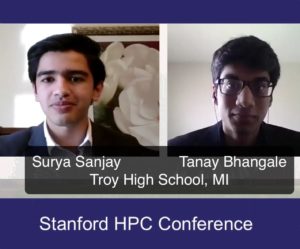 In this video from the Stanford HPC Conference, Surya Sanjay and Tanay Bhangale from Troy High School in Michigan describe how their proposal on combatting prion-based disease resulted in their first experiences with HPC at the Stanford High Performance Computing Center.
In this video from the Stanford HPC Conference, Surya Sanjay and Tanay Bhangale from Troy High School in Michigan describe how their proposal on combatting prion-based disease resulted in their first experiences with HPC at the Stanford High Performance Computing Center.
Proposal Abstract:
Prions are infectious proteins that cause diseases, such as Creutzfeldt-Jakob’s and mad cow disease, through intracellular aggregation. They are noted for their ability to convert the wild- type, benign (PrPC) prion into the infectious variant (PrPSc). Since their discovery in 1982, prions have had no viable treatment options, and only recently have the structures and replication method been fully deciphered. The anti-prion has been hypothesized as a prion conversion inhibitor, but although this prolongs lifespan, this doesn’t restore normal function, which is a pressing issue as prion function is not yet understood. To prove the feasibility of a new treatment model, we propose a novel prion protein variant that is benign, as functional as PrPC, and has the ability to catalyze the conversion of PrPSc into the novel variant. Using a model of the infectious murine prion and many mutagenized variants of the benign murine prion as PrPX, created with Rosetta’s ab initio software, we plan to perform molecular dynamics (MD) simulations with GROMACS 2020 to determine the success of models based on the described criteria. A machine learning method will then be utilized, identifying protein parameters that contribute most to the success of chosen models in order to create a confidence interval containing possible treatment options. Although prion disease has comparatively low incidence, the success of this model could allow for similar proteins (termed “prion-like”) like Aβ and tau that contribute to Parkinson’s, Alzheimer’s, and ALS to be targeted in a similar way in future studies.”
The HPC Center Stanford University is an entirely self sustaining academic service center run primarily by undergraduate students. This means that undergraduate students get an intensive learning experience and have the opportunity to work on production HPC systems. This has a significant positive impact on their future careers.
Download their PPrX Research Proposal (PDF)




